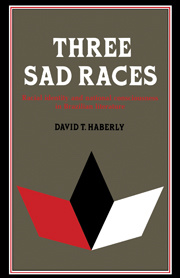Description
Three Sad Races
Racial Identity and National Consciousness in Brazilian Literature
Author: Haberly David T.
An innovative interpretation of the development of Brazilian literature from the sixteenth to the twentieth centuries, first published in 1983.
Language: EnglishApproximative price 43.91 €
In Print (Delivery period: 14 days).
Add to cart
Publication date: 01-2012
210 p. · 14x21.6 cm · Paperback
210 p. · 14x21.6 cm · Paperback
Description
/li>Contents
/li>
Brazilians have traditionally and very accurately viewed their nation as the product of the coming together and subsequent interaction of its disparate racial ancestry: native American Indians, Portuguese settlers and African slaves. Examining the social and cultural implications of this racial diversity is essential to the search for a viable and cohesive national identity, which has long been a major concern of Brazil's writers. Originally published in 1983, Three Sad Races is a study of how Brazilian literature - the only national literature in the Americas comparable in both quantity and quality to that of the United States - reflects these themes and gives vent to the general disquietude concerning the nation's predicament. Haberly presents an innovative interpretation of the development of Brazilian literature from the sixteenth to the twentieth centuries, as well as detailed critical analyses of the works of six of the nation's greatest writers.
Acknowledgements; Introduction; 1. From Indians to Indianism; 2. The songs of an exile: Antônio Gonçalves Dias; 3. The novelist as matchmaker: José de Alencar; 4. The poet as slave: Antônio de Castro Alves; 5. A journey through the escape hatch: Joaquim Maria Machado de Assis; 6. The black swan: João da Cruz e Sousa; 7. From despair to Modernism; 8. The harlequin: Mário de Andrade; Conclusion: the Edenic metaphor; Notes; Selected bibliography; Index.
© 2024 LAVOISIER S.A.S.


